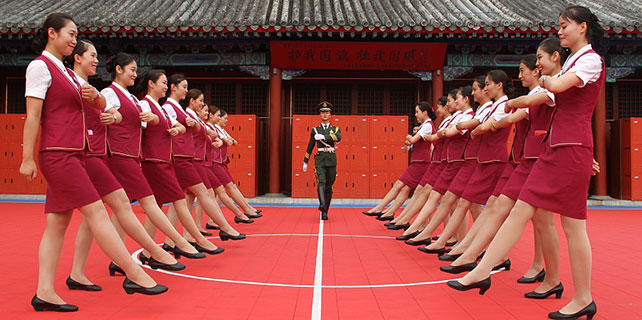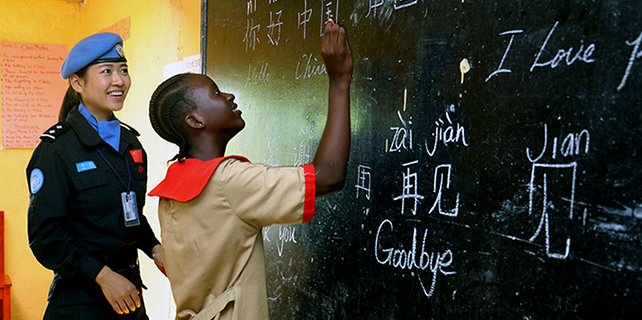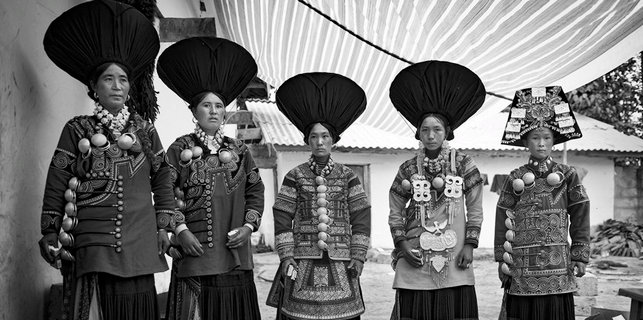Africa looks for inspiration from China

The importance of this meeting, the Africa-China High-Level Dialogue and Think Tank Forum: Fighting Against Poverty for Common Prosperity, is that it will deepen Sino-African anti-poverty efforts.
China has not only succeeded in its poverty reduction strategies and programs, but also committed itself to lift out of poverty by 2020 all citizens who live under the poverty line.
What is truly much appreciated is China's commitment to work with 1.2 billion Africans on joint development, promote economic integration and build a joint community with a future free of poverty. We in Africa trust that this partnership will move our continent faster in its socio-economic transformation.
China has on many occasions expressed its commitment toward Africa with a diversified practical approach and developmental models with flexibility, offering technologies and investment without any conditions.
The work China has done in the very building hosting the headquarters of the African Union, which was built and donated to Africa by China, is work that reflects its love and respect for Africa and its people.
China no doubt is implementing on the world stage new developmental policies with a human face, unlike the forces of globalization which exploited Africa over the years.
Poverty is a global issue and poverty reduction must be a constant concern for those wishing to improve global governance. The UN Agenda 2030 for Sustainable Development says that eradicating poverty in all its forms and dimensions, including extreme poverty, is the greatest global challenge and indispensable requirement for sustainable development. It is clear that poverty reduction will help reduce inequality, facilitate inclusive growth, expand market
capacity, optimize division of labor and create a unified larger market through strengthening consumption which will inject new vigor and energy into economic growth.
China has a unique experience in poverty reduction: of the 1 billion lifted out of poverty around the world since 1990, 439 million were Chinese. In 2015 the United Nations Development Program calculated that China had contributed 76 percent to global poverty reduction.
Also, as China continues to play a more active role on the global stage, it is an ideal partner to work more closely with Africa and share its experience.
Eradicating poverty through industrial development is a core strategy adopted on a state level and to a larger scale by China. President Xi Jinping identified in his illuminating book, Up and Out of Poverty, industrial development as a key policy for development and to eradicate poverty.
Understandably, and while all literature on poverty eradication deals with policies that will lead to poverty reduction, we have to look into the sustainability of these policies; and if a reverse process will again send into poverty the same vulnerable groups we lifted out of poverty.
Many African countries that are implementing economic reform programs might find that an important portion of the population might reverse their limited gains and again end up below the poverty line. Although social justice programs are to be implemented in parallel with any reform program, limited government resources and restrictions imposed by the financial institutions like the IMF will restrict the size of the social basket.
In Egypt's case, after the November 2016 ambitious IMF economic reform program, the government has facilitated certain social safety nets to ease the burden on the poor and venerable segments of the people. They include limited subsidies for essential commodities and power, an increase in all kind of pensions, and additional allowances, both permanent and temporary, to salaries.
The social package is diverse and important, but it does not balance the huge impact of the IMF program.
However, the government is simultaneously working in the area of job creation in mega projects like the doubling of the Suez Canal, the national road schemes, the tunnels under the Suez Canal, the new Egyptian countryside project, the new administrative capital, and the industrial zones.
Poverty reduction can easily be subjected to setbacks, which will require continuous attention and monitoring to safeguard and sustain the policies that lead to poverty reduction. To properly study the China model on poverty reduction, we have to pay tribute to Xi's book, which encompasses a road map and a strategy to eradicate poverty.
In his book, Xi advises to make all proposals firmly rooted in the local situation and focus on the real target with the support of the economic programs that will help promote and execute the industrial strategy .
He is clear about the importance of opening up local markets to external resources to develop our own resources. He calls for bolder reforms and opening up the market to allow it grow faster. He advocates pro-poor policies and makes a call to keep the people close to the heart. Confidence, trust and spirit are essential and prerequisites to ensure success and the
good conduct of the leadership. He believes in young, talented and motivated leadership.
He recommends one step at a time, which leads to success in the way water drops drill through rocks.
He believes that if we look into ourselves for answers and become self-reliant, we will then be able to cast out our fear and move forward with ease as the process of poverty irradiation is a long-term task. He trusts that no mater how weak a state is, it can fly if it depends to a larger extent on mobilizing efforts and resources, or "letting the weak hatchlings be the first to fly".
The author is a former assistant foreign Minister of Egypt.
















